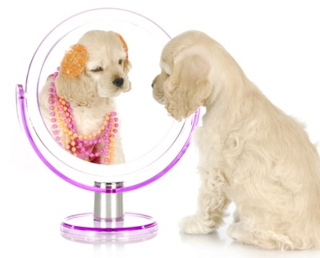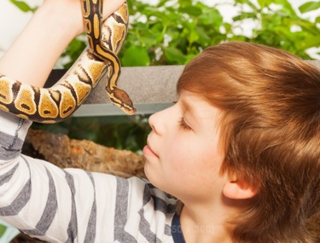Animal Behavior
Narcissism and Exotic Pets: Is There a Connection?
"Dark personality traits" affect attachments to traditional and exotic pets.
Posted October 31, 2016

There are lots of studies of the personalities of pet owners, but most of them have looked for differences between “dog people” and “cat people." And virtually nothing is known about pet owners who score high on so-called "dark personality traits" such as narcissism. A forthcoming research article in the journal Anthrozoös, however, addressed these issues, and the results are intriguing.
The research team was headed by Jennifer Vonk, a psychologist at Oakland University. They wanted to know how two sets of dark traits—narcissism and borderline personality characteristics—are related to levels of attachment to both traditional and unconventional companion animals like snakes, tarantulas, and rats.
The researchers hypothesized that because they like to draw attention to themselves, narcissists would be more likely to keep exotic or unconventional pets. But narcissism is characterized by superficial relationships and a lack of empathy, so the researchers also thought narcissists would be less attached to the animals in their lives. In addition, Vonk’s team predicted people with “borderline personality traits” (impulsive, unstable, anxious, moody, hostile) would be less attached to their companion animals. Finally, based on the findings of previous studies, the researchers hypothesized that pet owners high in neuroticism would be more attached to their pets.
Testing the Hypotheses
To test their ideas, the researchers gave 325 pet owners a series of standardized psychological scales. The participants were a mix of university students and people recruited through personal contacts and websites.Two hundred and seventeen of the subjects rated their attachments to traditional companion animals such as dogs, cats, and hamsters, and 108 of them rated their attachment levels to their unusual or exotic pets. Among these were lizards, snakes, amphibians, monkeys, insects, rats, and spiders. The participants took these personality and pet attachment measures on-line. They included:
- The Big Five Personality Inventory measures individual differences on five personality traits - extroversion, openness, conscientiousness, neuroticism, and anxiety. You can take it yourself here.
- A pet attachment scale constructed by the researchers was comprised of 64 items taken from existing companion animal attachment scales.
- The Pathological Narcissism Inventory is a 52-item questionnaire that measures two types of narcissism. “Grandiose narcissists” are manipulative and have an inflated sense of their self-worth, and a marked sense of entitlement. (Sample item: “I can make anyone believe anything I want them to.”) “Vulnerable narcissism,” on the other hand, is characterized by deep insecurities. (Sample item: “Sometimes I avoid people because I’m concerned they won’t acknowledge what I do for them.”) As Vonk explained to me in an e-mail: “Vulnerable narcissism is characterized by high emotional volatility and is the form of narcissism that involves a more defensive style, such that individuals are highly reactive to threats to feelings of self-worth.”
- The Borderline Personality Features Scale is a 24-item questionnaire that assesses characteristics of borderline personality. (Sample item: "I worry a lot about people leaving me.")
Exotic Pets, Narcissism, and Attachment
Many of the results did not turn out the way the researchers predicted. Contrary to their first hypothesis, individuals scoring high in narcissism were not more likely to own exotic pets. And, counter to their second hypothesis, as a group, narcissists were not less attached to their pets.
Further analysis of the data, however, revealed some interesting findings.
- People high in vulnerable narcissism were more attached to their pets—but only if the pet was unconventional.
- And people high in grandiose narcissism were more attached to their pets—but only if the pet was a traditional companion animal.
- Consistent with other studies, people scoring high on the personality traits of agreeableness and openness to new experiences were more attached to their pets.
- But, counter to the researchers’ expectations, Big Five neuroticism scores were not related to attachment to pets.
- As predicted, participants who scored high on borderline personality traits tended to be less attached to their pets, though the relationship was modest.
- In general, participants were more attached to traditional than exotic pets.
- Women were more attached to pets than were men.

I was not surprised by the lack of relationship between non-traditional pet ownership and narcissism. As a high school student growing up with very tolerant parents, I maintained a menagerie of snakes and lizards in the basement of my house. My attraction to exotic creepy-crawlies had nothing to do with a misguided desire to enhance my social status; it had everything to do with an abiding fascination with the alien beauty of creatures like a red-tail boa constrictor, an indigo snake, or a bearded dragon.
Indeed, owners of some unconventional pets incur a social cost. Several years ago, one of my students investigated people who kept pet rats. A rat person herself, she discovered that many of the rat fanciers she interviewed were embarrassed by their affection for rodents. They kept it quiet. They wanted to stay in closet.
Are Exotic Pets Unethical?
I now look back on my teenage preference for exotic pets with a feeling of guilt. The upside of my early interest in reptiles was that it eventually led me to pursue a Ph.D. in animal behavior and to subsequently investigate the love songs of alligators (here) and the personalities of garter snakes (here). However, in her new book Run, Spot, Run: The Ethics of Keeping Pets, the bioethicist and Psychology Today blogger Jessica Pierce argues that it is cruel to keep wild animals and even birds and tropical fish in captivity simply because they bring us pleasure. And now I agree. It’s clear to me that we should not make pets of creatures that need to spend their lives in a cage.
My hat’s off to the Oakland University researchers. They are the first to explore how dark personality traits impact our relationship to both traditional and unusual species of pets. While their results were not what they had anticipated, they have taken the study of the psychology of human-companion animal relationships into new and interesting territory.
(For an excellent perspective on pet owner personality research, see this post by PT blogger Susan Whitbourne.)
References
Vonk, J., Patton, C. & Galvan, M. (in press). Not so cold-blooded: Narcissistic and borderline personality traits predict attachment to traditional and non-traditional pets. Anthrozoös.
* * * *
Hal Herzog is Emeritus Professor of Psychology at Western Carolina University and the author of Some We Love, Some We Hate, Some We Eat: Why It's So Hard To Think Straight About Animals (HarperCollins)
Follow me on Twitter.




